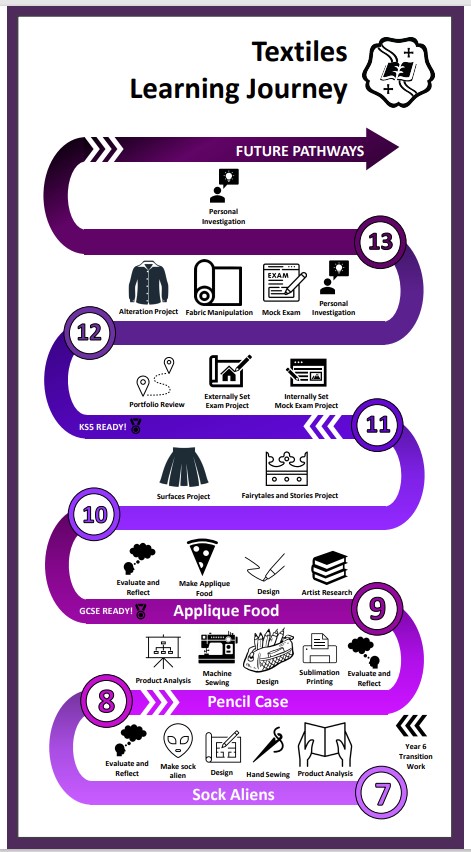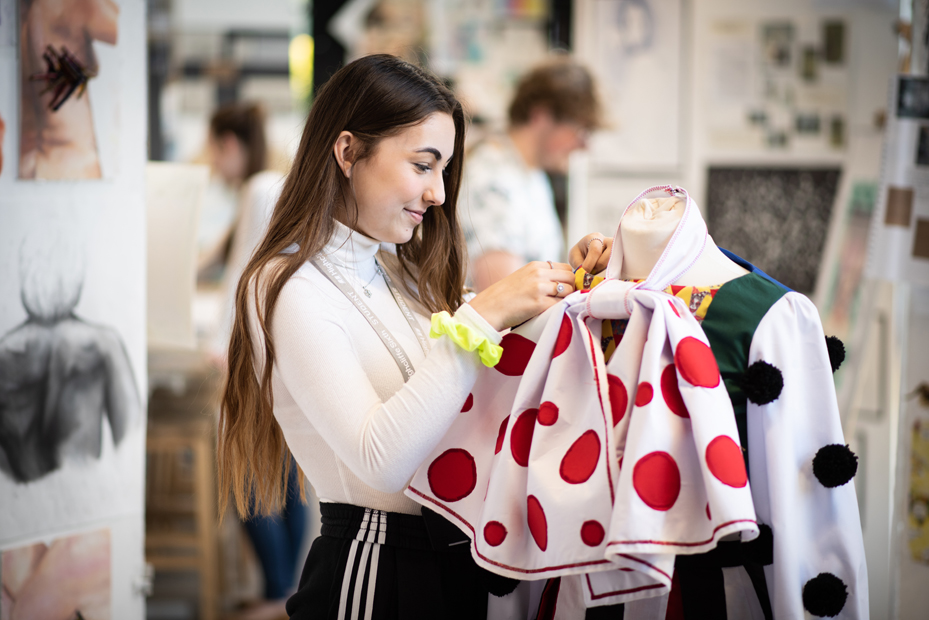Textiles
Subject Mission Statement
Art, Design and Technology subjects sit in the
curriculum to develop students practical hands-on learning experience. Students
develop the skills to be independent and creative developing their knowledge of
both technical and life skills. Our curriculum is one that offers something for
all, where diversity and individuality is celebrated, and personal outlet is
encouraged and embraced.
Overview
The Textiles Design
course complements the GCSE Art and Design courses offered in Graphics,
Textiles Design and Fine Art. It is recommended that one of the following
courses has been successfully completed at GCSE, to maintain the high demand of
work and independence required to study the course. Students will produce
practical and critical/contextual work in one or more areas of study, for
example: Fashion Design, Fashion Textiles, Costume Design, Digital Textiles,
Printed and Dyed Fabrics and Materials, Domestic Textiles, Wallpaper, Interior
Design, Constructed Textiles, Art Textiles and Installed Textiles. The course
will comprise of a personal investigation, which will include written material
around a student’s individual artwork and chosen line of enquiry. This will
include a structured, extended response of between 1000 and 3000 words of
continuous prose. Each student’s investigation will be an in-depth study that
demonstrates the student’s ability to construct and develop a sustained line of
reasoning from an initial starting point to a final realisation. There is also
an externally set practical assignment including a development period from the
1st February, plus a 15 hour supervised examination.
KS5 Intent Statement
Art, Design and Technology subjects at A level sit in the curriculum to extend our visual and oral literacy. At A level, students lead learning through a ‘Personal Investigation’. Students build on their knowledge developed at GCSE, extending their self-discovery and independence. The Art and Design A level course is designed to develop, students as individual artists and designers encouraging them to become aware of their strengths and passions in their own genre.
Year 12 builds the bridge between GCSE and A level following the more traditional AS route. This Year is built around discovery and investigation, learning new techniques and skills whilst embracing risk taking. Scale becomes important and student are encourage through workshop lead lessons to work out of their comfort zones: on the floor, easels, working in the darkroom, making small and large scale models and prototypes and learning to use new IT programmes. Time management and independent work is encouraged and students embrace the opportunity to work in the wonderful university hub the Da Vinci building offers. In Year 13 Fine Art and Textile student have their own studio space to display work. Working in the building in their own time on their own work is embraced by all disciplines.
Conceptual and critical analyses of own work and the work of others is integral to individual learning and is at the driving force for developing literacy skills and higher order thinking - developing a broader knowledge of their own subject terminology and understanding. Opportunities for peer discussion and sharing of group ideas are introduced to build confidence and awareness of self-value, supported by learning from one another. A level embraces supporting each other’s ideas and values preparing students for the next steps for university adding a level of maturity through discussion based learning seen in, group critics and evaluations.
Extended learning opportunities such as gallery trips, life drawing, AUB relationships/workshops talks, exhibitions, students work own displays in internal and external exhibitions, are crucial to celebrate and embrace work of all student of all abilities. Setting expectations high and being the best you can possibly be, whilst learning those important life skills about who you are as an individual, support our student’s social, moral and cultural understanding and wellbeing.
At KS5 many student take on the role of the subject ambassador in Art and Design and Technology. It is a prestigious role, which involves students at KS5 being a huge support to the Da Vinci team of staff and students. The opportunity to share student’s passion and enthusiasm for a particular subject is at the forefront of the ambassador role, individuals develop their confidence in working with other creative students across the school. This role supports progression for KS4 – 5 transition. Ambassadors highly value students, who work with lower school to share their experiences, knowledge and passions.
Aspirations for Further Education in the wider world of ADT are embraced and students are supported in their next steps. Many choosing to do the foundation course at Arts University Bournemouth and then progress onto degree level. A Level in ADT develops confident self-aware individuals. Who not only develop the high end skills in their genre and passion, but also those all-important life skills as they develop who they are as individuals whilst very in tune with the wider world around them.
Qualification Details
Exam Board: AQA
Qualification Title: Textiles
Qualification Specification Code: 7204
Qualification Webpage: Click here to visit the AQA webpage for the specification.
Entry Requirements
Standard Sixth Form entry requirements
What will I study in this qualification?

Possible Career Paths
Art related
degrees, Professional Artist, Printmaker, Clothing or Textile Technologist,
Colour Technologist, Interior and Spatial Designer, Fashion and Costume
Designer, Textile Designer. Students will develop the independent skills
required to move onto Further or Higher Education or moving into the Design
Industry. The course encourages students to develop their own style as an
Artist, whilst covering the requirements of the four assessment objectives.
Who should I speak to if I need further information?
Mrs E. Stoodley


